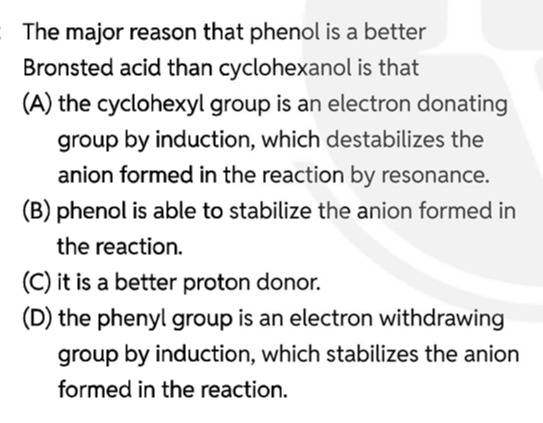Question
Question: The major reason that phenol is a better Bronsted acid than cyclohexanol is that...
The major reason that phenol is a better Bronsted acid than cyclohexanol is that

the cyclohexyl group is an electron donating group by induction, which destabilizes the anion formed in the reaction by resonance.
phenol is able to stabilize the anion formed in the reaction.
it is a better proton donor.
the phenyl group is an electron withdrawing group by induction, which stabilizes the anion formed in the reaction.
phenol is able to stabilize the anion formed in the reaction.
Solution
A Bronsted acid is a proton (H+) donor. The strength of an acid is determined by the stability of its conjugate base. A more stable conjugate base corresponds to a stronger acid.
Let's compare phenol and cyclohexanol:
-
Phenol (C6H5OH): When phenol loses a proton, it forms the phenoxide ion (C6H5O−). The negative charge on the oxygen atom in the phenoxide ion can be delocalized into the benzene ring through resonance. This delocalization spreads the negative charge over the oxygen atom and the ortho and para carbon atoms of the ring, effectively stabilizing the phenoxide ion.
Resonance structures of phenoxide ion show the delocalization of negative charge.
-
Cyclohexanol (C6H11OH): When cyclohexanol loses a proton, it forms the cyclohexanoxide ion (C6H11O−). The cyclohexyl group is a saturated alicyclic ring and does not have a pi system for resonance. Therefore, the negative charge on the oxygen atom in the cyclohexanoxide ion is localized solely on the oxygen. Furthermore, the cyclohexyl group is an alkyl group and exhibits an electron-donating inductive effect (+I effect). This electron-donating effect increases the electron density on the already negatively charged oxygen, making the cyclohexanoxide ion less stable.
Conclusion:
The phenoxide ion is significantly more stable than the cyclohexanoxide ion due to resonance stabilization. Because the conjugate base of phenol (phenoxide ion) is more stable, phenol is a stronger Bronsted acid than cyclohexanol.
